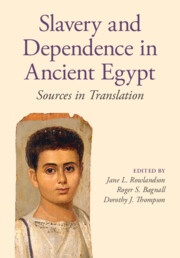Book contents
- Frontmatter
- Contents
- List of illustrations
- List of maps
- List of contributors
- Biographical notice on Jane Rowlandson
- Preface
- List of abbreviations
- Note to the reader
- Aids for the reader
- Glossary of technical terms
- 1 Introduction
- 2 Pharaonic Egypt
- 3 The Late Period
- 4 Jewish perspectives on slavery in Egypt
- 5 Ptolemaic Egypt
- 6 Roman Egypt
- 7 Byzantine and Umayyad Egypt
- Concordance of texts
- Bibliography
- Index
1 - Introduction
Published online by Cambridge University Press: 01 March 2024
- Frontmatter
- Contents
- List of illustrations
- List of maps
- List of contributors
- Biographical notice on Jane Rowlandson
- Preface
- List of abbreviations
- Note to the reader
- Aids for the reader
- Glossary of technical terms
- 1 Introduction
- 2 Pharaonic Egypt
- 3 The Late Period
- 4 Jewish perspectives on slavery in Egypt
- 5 Ptolemaic Egypt
- 6 Roman Egypt
- 7 Byzantine and Umayyad Egypt
- Concordance of texts
- Bibliography
- Index
Summary
This chapter introduces the following corpus of texts from ancient Egypt, and outlines the differing meanings ascribed to slavery and dependence from antiquity to modern times. The terms used for dependents and slaves in the various languages of the texts translated here – Egyptian (Hieroglyphic, Hieratic, Demotic, and Coptic), Greek, and Arabic – are briefly presented, and defining features of the condition of those so labelled are discussed. How and from where such persons were acquired, their life experiences, and the different forms of exploitation in which they were involved are introduced, as are forms of slave resistance and limits to the archaeological and textual evidence available, and so to what we can learn from it.
- Type
- Chapter
- Information
- Slavery and Dependence in Ancient EgyptSources in Translation, pp. 1 - 36Publisher: Cambridge University PressPrint publication year: 2024

